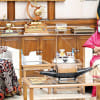Forex volatility costs large firms Tk 65,000cr

Bangladesh's conglomerates have lost Tk 65,000 crore over the past one year because of the fluctuation of the value of the taka against the US dollar as loans have become costlier due to the volatile global economy, said a noted economist yesterday.
Previously, conglomerates used to buy $100 at Tk 8,200, but over the last one year, they have bought the same $100 for Tk 10,500, said Ahsan H Mansur, executive director of the Policy Research Institute of Bangladesh.
Since the taka depreciated sharply, corporates have had to pay more to purchase the American greenback, he said.
The noted economist made the remarks while speaking at a roundtable styled "Monetary policy 2022-2023" organsied by the Institute of Chartered Accountants of Bangladesh (ICAB) at its office in the capital.
The taka has lost its value by about 25 per cent against the American greenback since Russia's war in Ukraine began in February last year and nearly 14 per cent in July-December, data from the central bank showed.
So, many conglomerates lost Tk 400 crore and Tk 500 crore in the first and second quarters of the current fiscal year, said Mansur.
"What is even worse, 90 per cent to 95 per cent of profits of corporates declined because of the volatility in the exchange rate."
Bangladesh has been going through an exchange rate volatility after foreign currency reserves came under pressure to pay for the import bills escalated by the war.
Bangladesh has lost $14 billion from the financial account over the last one year because of a lack of proper management of the economy, said the former economist of the International Monetary Fund.
The financial account covers claims on or liabilities to foreigners concerning financial assets and includes direct investment, portfolio investment, and reserve assets.
Mansur explained that historically the financial account of the balance of payments of Bangladesh has experienced a surplus almost every year.
For example, the financial account was $14.06 billion in surplus in the last financial year and $13.77 billion in 2021-22. It turned a deficit of $157 million in the July-November period of the current fiscal year, BB data showed.
The economist suggested resolving the dollar crisis immediately so that the economy does not suffer any longer.
Owing to the dollar crunch, the opening of the letters of credit (LCs) also dropped as the central bank tightened rules to discourage the imports of non-essential and luxury items.
Mansur suggested a floating exchange rate instead of the existing managed ones to ride out the current crisis.
If the floating exchange rate reaches Tk 112 per dollar, then it would still be good for the economy in the future compared to Tk 130 under a managed exchange rate regime, he said.
"The market should determine the dollar rate and artificially fixing the rate is not the right decision."
Mahbub Ahmed, a former senior finance secretary, backed the semiannual publication of monetary policy statement (MPS).
Ferdaus Ara Begum, chief executive officer of the Business Initiative Leading Development, said the MPS needed to emphasise more on employment generation and investment.
She criticised the BB decision to raise the interest rate to 12 per cent from 9 per cent for consumer loans whereas the lending rate has remained unchanged at 9 per cent for large industrial credits.
She suggested the government recover non-performing loans and be serious about preventing trade-based money laundering as a section of traders is siphoning money through trade over- and under-invoicing.
Economists are suggesting the withdrawal of the lending rate cap to check inflation, restore stability in the foreign exchange market, support desired economic growth, and ensure the necessary flow of funds to productive and employment-generating activities, said Md Moniruzzaman, president of the ICAB.
"The increase in the policy rate will create liquidity pressure in the banking sector. But it will take time to slow down the money supply."
The BB has set a lower private sector credit growth target of 14.1 per cent for the current fiscal year compared to 14.80 per cent in FY22.
"If the lending rate cap is withdrawn, the interest rate on import financing will rise substantially and this will bring stability to the foreign exchange market," Moniruzzaman said.
"Further increases in LC margins will push up prices and reduce demand for foreign exchanges."
However, the monetary policy includes some expansionary measures, such as a new refinance scheme to boost the production of import-substitute goods, he said.
Humayun Kabir, a former president of the ICAB, moderated the discussion.
Shubhashish Bose, CEO of the ICAB, Muhammad Abdul Mazid, a former chairman of the National Board of Revenue, Jamaluddin Ahmed, a former president of the ICAB, and Zakir Hossain, business editor of the Samakal, also spoke.

 For all latest news, follow The Daily Star's Google News channel.
For all latest news, follow The Daily Star's Google News channel. 








Comments